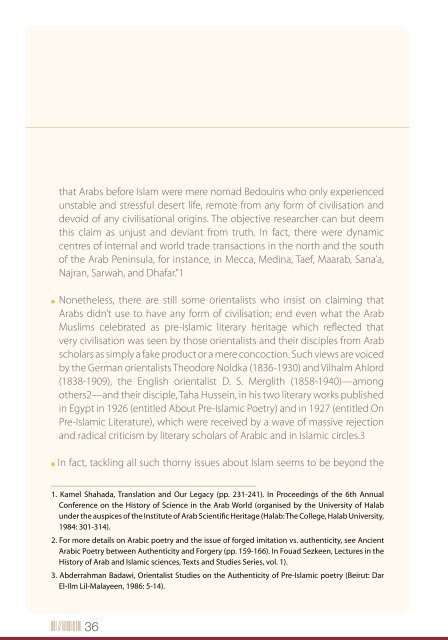General Supervisor
General Supervisor
General Supervisor
You also want an ePaper? Increase the reach of your titles
YUMPU automatically turns print PDFs into web optimized ePapers that Google loves.
that Arabs before Islam were mere nomad Bedouins who only experienced<br />
unstable and stressful desert life, remote from any form of civilisation and<br />
devoid of any civilisational origins. The objective researcher can but deem<br />
this claim as unjust and deviant from truth. In fact, there were dynamic<br />
centres of internal and world trade transactions in the north and the south<br />
of the Arab Peninsula, for instance, in Mecca, Medina, Taef, Maarab, Sana’a,<br />
Najran, Sarwah, and Dhafar.”1<br />
Nonetheless, there are still some orientalists who insist on claiming that<br />
Arabs didn’t use to have any form of civilisation; end even what the Arab<br />
Muslims celebrated as pre-Islamic literary heritage which reflected that<br />
very civilisation was seen by those orientalists and their disciples from Arab<br />
scholars as simply a fake product or a mere concoction. Such views are voiced<br />
by the German orientalists Theodore Noldka (1836-1930) and Vilhalm Ahlord<br />
(1838-1909), the English orientalist D. S. Merglith (1858-1940)—among<br />
others2—and their disciple, Taha Hussein, in his two literary works published<br />
in Egypt in 1926 (entitled About Pre-Islamic Poetry) and in 1927 (entitled On<br />
Pre-Islamic Literature), which were received by a wave of massive rejection<br />
and radical criticism by literary scholars of Arabic and in Islamic circles.3<br />
In fact, tackling all such thorny issues about Islam seems to be beyond the<br />
1. Kamel Shahada, Translation and Our Legacy (pp. 231-241). In Proceedings of the 6th Annual<br />
Conference on the History of Science in the Arab World (organised by the University of Halab<br />
under the auspices of the Institute of Arab Scientific Heritage (Halab: The College, Halab University,<br />
1984: 301-314).<br />
2. For more details on Arabic poetry and the issue of forged imitation vs. authenticity, see Ancient<br />
Arabic Poetry between Authenticity and Forgery (pp. 159-166). In Fouad Sezkeen, Lectures in the<br />
History of Arab and Islamic sciences, Texts and Studies Series, vol. 1).<br />
3. Abderrahman Badawi, Orientalist Studies on the Authenticity of Pre-Islamic poetry (Beirut: Dar<br />
El-Ilm Lil-Malayeen, 1986: 5-14).<br />
36<br />
scope of this paper. It would also be difficult for the researcher to identify<br />
them in a variety of branches of knowledge (scientific or artistic) where<br />
Muslims have taken the initiative and excelled in creativity or where they<br />
refined their predecessors’ existing contributions in science and arts. The<br />
aforementioned controversies are so ramified that they required collective<br />
research efforts in order to determine their origins and loci and investigate<br />
them so as to assess their veracity or falsehood. This would guarantee the<br />
objectivity required by scientific scrutiny based on solid evidence and<br />
capable of proving truth via using a clear methodology, without hostility<br />
motivated by personal reasons. Such a scientific project would equally<br />
include highlighting the status of Muslims in the civilisational map—as it<br />
were—and the extent of their contribution to transferring civilisation down<br />
from historically preceding as well as contemporary nations after verifying<br />
its authenticity within the framework of Islamic culture.1<br />
Orientalists often seek and find support for their claims in the huge amount<br />
of disparate data published in the books of Arab and Islamic history, certain<br />
books reporting the prophet’s tradition, some exegetical accounts—all of<br />
them teeming with undocumented data, including what is known in the<br />
science of exegesis as “Israelite data” used by certain exegetes without<br />
any annotation or comment about their veracity,2 especially those data<br />
openly contradicting the Holy Book and the Prophet’s Tradition and whose<br />
1. For more data on the status of Muslims in the history of sciences, reference is made to those<br />
contributions which focused on the history of Arab literature and heritage, written by orientalists,<br />
Arabs, and Muslims. See, for instance, Fouad Sezkeen, Lectures in the History of Arab and Islamic<br />
sciences, Texts and Studies Series, vol. 1 (Frankfurt: The Institute of Arab and Islamic science<br />
History, 1984: 183).<br />
2. Mostapah Hussein, Israelite Narratives in the Islamic Heritage (pp. 75-137). In Conference on the<br />
Prophet’s Tradition (Tripoli, Libya: International Association of Islamic Daawa/ Propaganda, 1986).<br />
37


